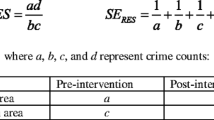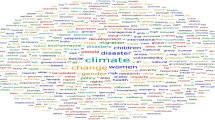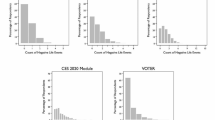Abstract
There is a vast body of literature on survivors of political violence that has emerged over the past several decades. Most studies focus on the psychological effects of political violence on survivors, as understood within the Western framework of mental health. Studies that conceptualize and examine models that account for the complexity of the ecology of political violence are scarce. This paper synthesizes current conceptual and empirical findings about survivors of political violence. Interventions stemming from an ecological framework are also reviewed.
Similar content being viewed by others
References
Anderson, T. P. (1976). The social and cultural roots of political violence in Central America. Aggressive Behavior, 2(4), 249–255.
Ascher, W. (1986). Comments on “A cross-cultural theory of political conflict and violence”. Political Psychology, 7(3), 471–473.
Barber, B. K. (2001). Political violence, social integration, and youth functioning: Palestinian youth from the Intifada. Journal of Community Psychology, 29(3), 259–280.
Barber, B. K. (2008). Contrasting portraits of war: youths’ varied experiences with political violence in Bosnia and Palestine. International Journal of Behavioral Development, 32, 298–309.
Basoglu, M., Paker, M., Paker, O., Ozmen, E., Marks, I., Incesu, S., et al. (1994). Psychological effects of torture: a comparison of tortured with nontortured political activists in Turkey. The American Journal of Psychiatry, 151(1), 76–81.
Blackwell, D. (2005). Torture and organized violence psychotherapy, politics and trauma: working with survivors of torture and organized violence. Group Analysis, 38(2), 307–323.
Bronfenbrenner, U. (1979). The ecology of human development: Experiments by nature and design. Cambridge: Harvard University Press.
Buitrago Cuellar, J. E. (2004). Internally displaced Colombians: The recovery of victims of violence within a psychosocial framework. In K. E. Miller & L. M. Rasco (Eds.), The mental health of refugees: Ecological approaches to healing and adaptation (pp. 229–262). Mahwah: Erlbaum.
CODEPU. (1989). The effects of torture and political repression in a sample of Chilean families. Social Science & Medicine, 28, 735–740.
Cummings, E. M., Goeke-Morey, M., Schermerhorn, A. C., Merrilees, C. E., & Cairns, E. (2009). Children and political violence from a social ecological perspective: Implications from research on children and families in Northern Ireland. Clinical Child and Family Psychology Review, 12(1), 16–38.
Dubow, E. F., Huesmann, L. R., & Boxer, P. (2009). A social-cognitive-ecological framework for understanding the impact of exposure to persistent ethnic–political violence on children’s psychosocial adjustment. Clinical Child and Family Psychology Review, 12(2), 113–126.
Gledhill, J. (2005). States of contention: state-led political violence in post-socialist Romania. East European Politics & Societies, 19(1), 76–104. doi:10.1177/0888325404270967.
Goenjian, A. K., Steinberg, A. M., Najarian, L. M., Fairbanks, L. A., Tashjian, M., & Pynoos, R. S. (2000). Prospective study of posttraumatic stress, anxiety, and depressive reactions after earthquake and political violence. The American Journal of Psychiatry, 157(6), 911–895.
Haj-Yahia, M. M. (2008). Political violence in retrospect: its effect on the mental health of Palestinian adolescents. International Journal of Behavioral Development, 32, 283–289.
Harvey, M. R. (1996). An ecological view of psychological trauma and trauma recovery. Journal of Traumatic Stress, 9(1), 3–23.
Hill, T. E., Jr. (1997). A Kantian perspective on political violence. The Journal of Ethics, 1, 105–140.
Jarymowicz, M., & Bar-Tal, D. (2006). The dominance of fear over hope in the life of individuals and collectives. European Journal of Social Psychology, 36, 367–392.
Jones, L., & Kafetsios, K. (2005). Exposure to Political Violence and Psychological Well-being in Bosnian Adolescents: A Mixed Method Approach. Clinical Child Psychology and Psychiatry, 10(2), 157–176.
Kerestes, G. (2006). Children’s aggressive and prosocial behavior in relation to war exposure: Testing the role of perceived parenting and child’s gender. International Journal of Behavioral Development, 30(3), 227–239.
Lupsha, P. (1971). Explanation of political violence: some psychological theories versus indignation. Politics Society, 2, 89.
Martín-Baró, I. (1989). Political violence and war as causes of psychosocial trauma in El Salvador. International Journal of Mental Health, 18(1), 3–20.
McAloney, K., McCrystal, P., Percy, A., & McCartan, C. (2009). Damaged youth: prevalence of community violence exposure and implications for adolescent well-being in post-conflict Northern Ireland. Journal of Community Psychology, 37(5), 635–648.
McKinney, K. (2007). ‘Breaking the conspiracy of silence’: testimony, traumatic memory, and psychotherapy with survivors of political violence. Ethos, 35(3), 265–299.
Milgram, S. (1965). Some conditions of obedience and disobedience to authority. Human Relations, 18, 214–228.
Miller, K. E. (1999). Rethinking a familiar model: psychotherapy and the mental health of refugees. Journal of Contemporary Psychotherapy, 29(4), 283–306.
Miller, K. E., & Rasco, L. M. (Eds.). (2004). An ecological framework for addressing the mental health needs of refugee communities. The mental health of refugees: Ecological approaches to healing and adaptation (pp. 1–64). Mahwah: Erlbaum.
Miller, K. E., Kulkarni, M., & Kushner, H. (2006). Beyond trauma-focused psychiatric epidemiology: bridging research and practice with war-affected populations. The American Journal of Orthopsychiatry, 76(4), 409–422.
Paardekooper, B., de Jong, J. T. V. M., & Hermanns, J. M. A. (1999). The Psychological Impact of War and the Refugee Situation on South Sudanese Children in Refugee Camps in Northern Uganda: An Exploratory Study. Journal of Child Psychology and Psychiatry, 40(4), 529–536.
Peltzer, K. (2001). An integrative model for ethnocultural counseling and psychotherapy of victims of organized violence. Journal of Psychotherapy Integration, 11(2), 241–262.
Punamaki, R.-L. (1990). Relationships between political violence and psychological responses among Palestinian women. Journal of Peace Research, 27(1), 75–85.
Qouta, S., Punamaki, R.-L., & El Sarraj, E. (2008). Child development and family mental health in war and military violence: the Palestinian experience. International Journal of Behavioral Development, 32, 310–321.
Ross, M. H. (1986). A cross-cultural theory of political conflict and violence. Political Psychology, 7(3), 427–469.
Sachs, D., Sa’ar, A., & Aharoni, S. (2007). ‘How can I feel for others when I myself am beaten?’ the impact of the armed conflict on women in Israel. Sex Roles, 57(7), 593–606.
Schwartz, S., & Melzak, S. (2005). Using storytelling in psychotherapeutic group work with young refugees. Group Analysis, 38(2), 293–306.
Snider, L., Cabrejos, C., Huayllasco Marquina, E., Trujillo, J. J., Avery, A., & Ango Aguilar, H. (2004). Psychosocial assessment for victims of violence in Peru: the importance of local participation. Journal of Biosocial Science, 36(4), 401–415.
Thabet, A. A. M., & Vostanis, P. (1999). Post-traumatic stress reactions in children of war. Journal of Child Psychology and Psychiatry, 40(3), 385–391.
Thabet, A. A. M., Abed, Y., & Vostanis, P. (2004). Comorbidity of PTSD and depression among refugee children during war conflict. Journal of Child Psychology and Psychiatry, 45(3), 533–542.
Webb, N. (Ed.). (2004). Mass trauma and violence: Helping families and children to cope. New York: Guilford Press.
Weine, S., Kulauzovic, Y., Klebic, A., Besic, S., Mujagic, A., Muzurovic, J., et al. (2008). Evaluating a multiple-family group access intervention for refugee with PTSD. Journal of Marital and Family Therapy, 34(2), 149–164.
Wessells, M., & Monteiro, C. (2004). Internally displaced Angolans: A child-focused, community-based intervention. In K. E. Miller & L. M. Rasco (Eds.), The mental health of refugees: Ecological approaches to healing and adaptation (pp. 67–94). Mahwah: Erlbaum.
Wieling, E., & Mittal, M. (2008). JMFT special section on mass trauma. Journal of Marital and Family Therapy, 34(2), 127–131.
Author information
Authors and Affiliations
Corresponding author
Rights and permissions
About this article
Cite this article
Stanciu, E.A., Rogers, J.L. Survivors of Political Violence: Conceptualizations, Empirical Findings, and Ecological Interventions. Int J Adv Counselling 33, 172–183 (2011). https://doi.org/10.1007/s10447-011-9120-x
Published:
Issue Date:
DOI: https://doi.org/10.1007/s10447-011-9120-x




